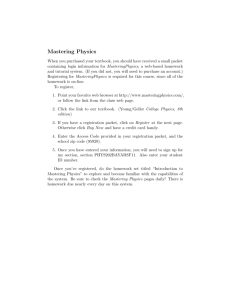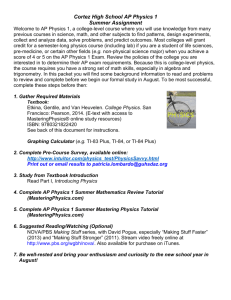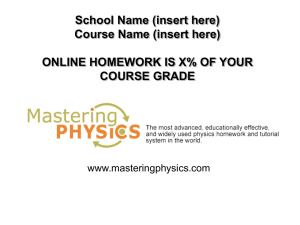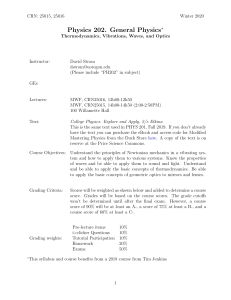Fall 2015 - Science Literacy Program
advertisement
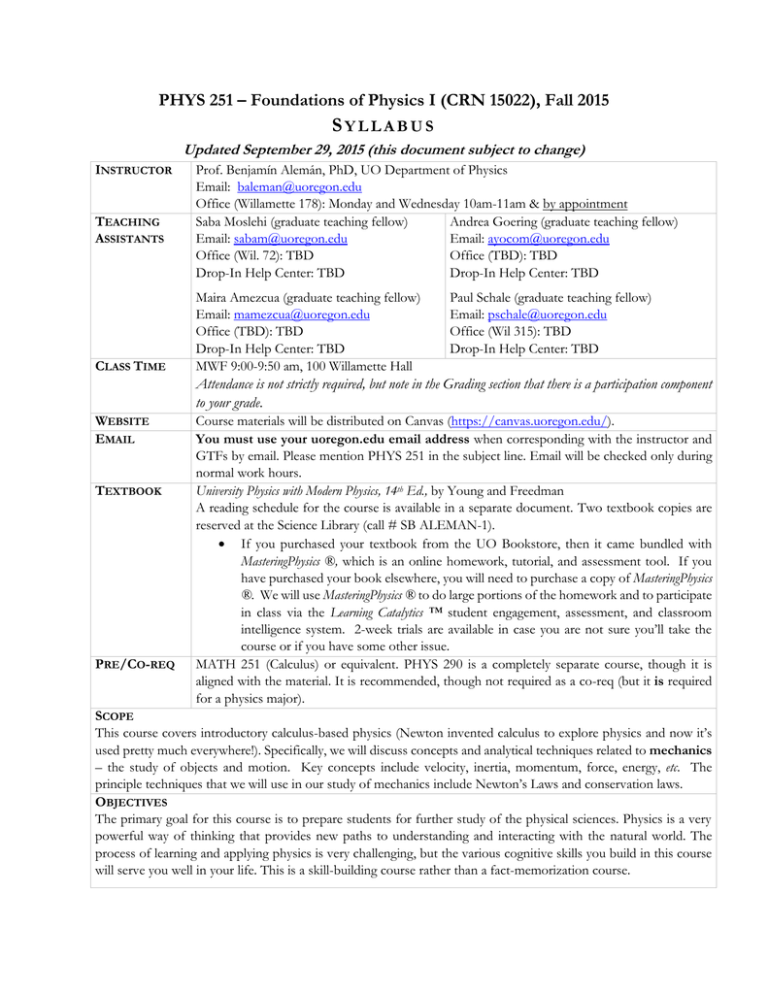
PHYS 251 – Foundations of Physics I (CRN 15022), Fall 2015 SYLLABUS Updated September 29, 2015 (this document subject to change) INSTRUCTOR TEACHING ASSISTANTS CLASS TIME Prof. Benjamín Alemán, PhD, UO Department of Physics Email: baleman@uoregon.edu Office (Willamette 178): Monday and Wednesday 10am-11am & by appointment Saba Moslehi (graduate teaching fellow) Andrea Goering (graduate teaching fellow) Email: sabam@uoregon.edu Email: ayocom@uoregon.edu Office (Wil. 72): TBD Office (TBD): TBD Drop-In Help Center: TBD Drop-In Help Center: TBD Maira Amezcua (graduate teaching fellow) Email: mamezcua@uoregon.edu Office (TBD): TBD Drop-In Help Center: TBD MWF 9:00-9:50 am, 100 Willamette Hall Paul Schale (graduate teaching fellow) Email: pschale@uoregon.edu Office (Wil 315): TBD Drop-In Help Center: TBD Attendance is not strictly required, but note in the Grading section that there is a participation component to your grade. WEBSITE EMAIL TEXTBOOK PRE/CO-REQ Course materials will be distributed on Canvas (https://canvas.uoregon.edu/). You must use your uoregon.edu email address when corresponding with the instructor and GTFs by email. Please mention PHYS 251 in the subject line. Email will be checked only during normal work hours. University Physics with Modern Physics, 14th Ed., by Young and Freedman A reading schedule for the course is available in a separate document. Two textbook copies are reserved at the Science Library (call # SB ALEMAN-1). If you purchased your textbook from the UO Bookstore, then it came bundled with MasteringPhysics ®, which is an online homework, tutorial, and assessment tool. If you have purchased your book elsewhere, you will need to purchase a copy of MasteringPhysics ®. We will use MasteringPhysics ® to do large portions of the homework and to participate in class via the Learning Catalytics ™ student engagement, assessment, and classroom intelligence system. 2-week trials are available in case you are not sure you’ll take the course or if you have some other issue. MATH 251 (Calculus) or equivalent. PHYS 290 is a completely separate course, though it is aligned with the material. It is recommended, though not required as a co-req (but it is required for a physics major). SCOPE This course covers introductory calculus-based physics (Newton invented calculus to explore physics and now it’s used pretty much everywhere!). Specifically, we will discuss concepts and analytical techniques related to mechanics – the study of objects and motion. Key concepts include velocity, inertia, momentum, force, energy, etc. The principle techniques that we will use in our study of mechanics include Newton’s Laws and conservation laws. OBJECTIVES The primary goal for this course is to prepare students for further study of the physical sciences. Physics is a very powerful way of thinking that provides new paths to understanding and interacting with the natural world. The process of learning and applying physics is very challenging, but the various cognitive skills you build in this course will serve you well in your life. This is a skill-building course rather than a fact-memorization course. The physics learning objectives of this course: Understand fundamental concepts underlying mechanics of the universe (how things move). Learn to build simplified theoretical models of complex physical systems. Apply fundamental physics concepts to find solutions to a wide range of practical problems. Learn how to analytically arrive at quantitative answers and interpret those quantitative results. Develop your ability to communicate this process to others (verbal, written, and graphical). Develop “numeracy”. Numeracy is the ability to communicate (read and write) using equations and numbers. Like literacy, it is an indispensable skill in modern life. Solving physics problems (assigned homework at the very least) is the only way to master these skills. The primary personal development objectives of this course: Increase your puzzle-solving skills and “working memory”. Learn to extract insights and enjoyment through deep contemplation of seemingly mundane things, like simple machines or the positions and movement of everyday objects. Develop a tolerance (perhaps even an enjoyment) of being confused and confronted with a seemingly intractable problem. Become part of the community of other physicists and scientists at the UO. Learn about research being done in the department. Learn about what it is like to be a professional scientist. COURSE STRUCTURE In this course, we will make use of active learning techniques (i.e., “clicker”-based class discussions, in-class activities, student-guided learning), in contrast to passive learning (i.e., me talking for an hour straight, guessing what you already know, dictating what you ought to learn, and you falling asleep in your seat and expecting to somehow understand and retain every word I say). Why? Many studies have shown that you learn science concepts much better in a class that uses active learning – for an excellent review on this, see S. Freeman et al., “Active learning increases student performance in science, engineering, and mathematics” Proceedings of the National Academy of Science 111, 8410–8415 (2014) [http://www.pnas.org/content/111/23/8410]. Also, it is more fun. SCHEDULE A schedule for the course is in an accompanying document. It includes a list of dates, topics covered, and required reading. This schedule will be changed as needed, so look to Canvas for the updated schedule. GRADING The following grading scheme is adopted to accomplish the goals discussed above. It is also designed to help you get a better course grade by diversifying what you are graded on. Activity Weight Participation (P) In-class clicker-based discussions and polls via Learning Catalytics (no penalty for 10% 3 skips) Tutorial (T) 10% Collaborative meetings on Tuesdays (no penalty for 1 skip) MasteringPhysics homework (MP) (lowest 3 scores dropped) 15% Written Homework (HW) 15% Written problem solutions due by 6:00pm Wednesdays (lowest score dropped) First Midterm Exam (MT1) 15% Wednesday, Oct 28, 6:00 PM, Willamette 100 Second Midterm Exam (MT2) 15% Wednesday, Nov 18, 6:00 PM, Willamette 100 Final Exam (F) 20% Friday, Dec. 11, 10:15 AM, Willamette 100 “CLICKERS” TUTORIAL MASTERINGPHYSICS HOMEWORK In general, vibrant class participation enhances all students’ learning experiences – one of the motivations for clicker usage and tutorials. Secondly, a goal of this course is for you to be able to communicate your understanding of physics principles, not just to the instructors but also to your peers. Therefore, your participation in discussions contributes to your grade. In the end, worry less about your grade and more about your ability to think critically, to find (creative) solutions to problems, and to communicate your solutions and thought process to others using words, equations and numbers. Final Grade: A=90-100%; B=80-89%; C=70-79%; D=60-69%; F<52%. For pass/fail grading option, a passing grade requires at least the equivalent of a C- grade. An A+ is only achievable by measurably making the course better for other students. One way to earn extra credit towards this goal is through active participation in the course discussion forum. In general, vibrant class participation enhances all students’ learning experiences – we will use the Learning Catalytics ™ “clicker” audience response system in class to mediate discussion. Learning Catalytics comes with your MasteringPhysics/textbook bundle and can be accessed directly from your MasteringPhysics account. In class responses are entered in Learning Catalytics by using a networked smartphone, tablet, or laptop computer. During class I will initiate a session with Learning Catalytics and then you can join the session by supplying the session code. When you join the session, you will be asked to identify your seat in the lecture hall; sometimes pockets of students can get stuck on a problem and the seat maps help me figure out where to focus more attention. You are expected to enter in your own answers. Clicking in for someone else who is not present or sharing the session code with someone who is not present is academic misconduct (see below). (In the past, this and similar courses have used (and use) stand-alone clickers, which cost $100; these clickers only do one thing—they respond to in-class queries. By using phones and laptops, which most of you already own, we’re saving money and getting convenience. If you don’t own one of these devices, you’ll need to purchase one or login using a separate browser on a neighbor’s device and share.) All tutorials are on Tuesdays in 112 Willamette. Tutorials are smaller meetings consisting of interactions with graduate TAs and small groups of other students. Tutorial attendance is not strictly mandatory, but each tutorial contributes roughly 1% to your final grade. MasteringPhysics is an online physics learning tool. Each regular MasteringPhysics unit will be made available one week in advance and will be due each Wednesday before 11:59 PM. An introductory MasteringPhysics assignment will be due by 11:59 PM on Friday of Week 1. Here are the steps to register your MasteringPhysics account: 1. Go to www.masteringphysics.com. Under the large Register Now section on the right side of the page, click the Student button. 2. Read the onscreen instructions and select your location. Next, check that you have a Course ID. For Course ID code enter MPALEMAN49944 and Click Go. 3. Next, check off whether or not you have an Access Code. An access code is provided with your UO Bookstore purchase. If you don’t have an access code and want to purchase access, select University Physics with Modern Physics, 14th Ed., by Young and Freedman as the textbook and whether you want to purchase an eText. 4. Before continuing, make sure you read and accept the License Agreement. After this, either Create a new Pearson username/password, or, if you’ve already registered for another Pearson product, enter that username/password. If you have an Access Code, enter it on the bottom of the page. 5. On the next page, fill out the appropriate information fields then click Next. If you entered an Access Code, you will be brought to a page from which you can access your product. If not, enter your payment information so that you can Purchase Access, after which you’ll be granted access. 6. You should now be registered. Next, enroll in the course by clicking Log In Now. Enter your course ID and your student ID when prompted. You should then be successfully enrolled in the course. WRITTEN HOMEWORK Homework will be a set of written problems. You must clearly communicate your analysis (solution). Certain labeled problems will be expected to have a more detailed, written solution. Turning in complete homework on time is crucial to getting a good grade in the class. Working (and struggling) on problems yourself provides the only opportunity to gain insight into the concepts you're learning and prepare for the exams. Furthermore, the exercises are designed to convey more material than what can be covered in class. Homework is due each Wednesday before 6:00 PM, in the appropriately labeled box in the basement of Willamette. Late homework turned in Thursday gets a 25% penalty, and after Thursday gets a 50% penalty. In calculating final grades, the lowest homework score of the term will be deleted, assuming the homework has been turned in and valid attempts have been made at all the problems. Thus, even if homework is late (even after Thursday) you are encouraged to turn it in so that it can be checked for completion and the low score can be removed during final grading. You are expected to make your best attempt at solving every problem by yourself before consulting with others. Thereafter, you are highly encouraged to work with others. However, the work you submit should be your own – never just copy, try to add your own comments and observations. You are discouraged from looking for solutions to problems online, but if you do you MUST cite your source (e.g., URL) and include your own additional comments and details. If you get the solution from somewhere else, you must include additional information (further analysis, filled-in details, comments, etc.) showing that you thoroughly understand the solution. Simply copying solutions and/or not citing sources will be treated as a violation of the Academic Code of Conduct. Solutions to all the problem sets will be posted – study these. MIDTERM EXAMS Grades will be posted to Canvas on or by the Wednesday after homework is turned in. Please check your Canvas account regularly and report any discrepancies or possible errors as soon as you notice them. Note: There will be a homework assignment due during Dead Week (i.e. the week of Nov. 30th) There will be two midterms, one at 6:00 PM on Wednesday, Oct. 28, and the second at 6:00 PM on Wednesday, Nov. 18. Both will take place in Willamette 100. There will be no makeup exams. If there is a serious (e.g. involving illness) and well-documented (e.g. with a doctor’s note) reason for missing the midterms, the final exam score will count extra, in place of the missed tests. In the event you score better on the Final than on either of the Midterms, your final exam score will replace your lowest midterm exam score. FINAL EXAM As determined by the Registrar’s Office (registrar.uoregon.edu/calendars/final_exam), the final exam will take place at 10:15 AM - 12:15 PM on Friday, December 11. You must take the exam at this time (no exceptions). Bring a calculator to the Final. HOW TO DO Do all the homework, turn it in on time, and study the solutions. WELL IN THE Participate in class and be engaged. COURSE DISCUSSION FORUM PHYSICS DROPIN HELP CENTER SPS STUDENTS WITH SPECIAL NEEDS LAPTOPS AND PHONES IN CLASS (NONE) ACADEMIC MISCONDUCT Read the suggested textbook sections before coming to class. Work through examples. Know that physics textbooks must be re-read multiple times for it to sink in. Pace your completion of the MasteringPhysics activities so that you finish relevant sections before coming to class. Avoid doing an entire week’s assignment the day it’s due. Participate in discussions in class and on the forum (both talking and listening). Work on understanding all the concepts and example questions discussed in the lectures and the homework. “Understanding” does not mean “it sounds like it makes sense to me,” but more deeply, “I could explain this concept to one of my classmates.” Come to office hours (especially with questions you think you should know!) Questions about the course or homework can be directed to the Course Discussion Forum on the Canvas. If you do not find the answer already there, then post your question. Others will probably have similar questions, and here they can be answered all at once. The Physics Drop-In Help Center in 147 Willamette is staffed by physics TAs during normal business hours. Specifically, PHYS 251 GTFs will also be available in The Drop-In center, but other GTFs will be available pretty much any time during normal working hours. Please notify Prof. Alemán if the room is unattended by a GTF. The UO has an active chapter of the Society of Physics Students (SPS). This is a good thing to be a part of if you wish to hear more about physics research and how to get involved. See http://physics.uoregon.edu/~sps/ for more information. If there are aspects of the instruction or design of this course that result in barriers to your inclusion, please notify me as soon as possible. You are also welcome to contact Disability Services in 164 Oregon Hall, 346-1155. Apart from the in-class clicker questions facilitated by Learning Catalytics ™ through the use of a silenced smartphone, tablet, or laptop, the use of laptop computers, tablets and phones in class is highly discouraged. Why? See http://web.stanford.edu/class/linguist156/laptops.pdf. Several studies show that students using laptops in class spend a great deal of time on non-class-related activities (texting, FB, playing games, etc.) and that these distractions negatively impact both learning and grades. This alone isn’t a reason to ban laptops – you’re responsible for your own performance in class. However, studies have shown that laptop use distracts and impacts the learning of other students nearby. (E.g. Fried, C. B. Computers & Education 50, 906-914 (2008).) Plus, students have complained about the environment created by their classmates’ laptop use. Taking notes by hand, by the way, is shown to be more effective in cementing concepts in your mind (H. Hembrooke, H. and Gay, G., J. Comput. High. Educ. 15, 46–64 (2003) and Mueller, P. A., Oppenheimer, D. M., Psychological Science, 0956797614524581 (2014)). You can always take a quick photo of your notes if you want a digital copy. Students have the responsibility to behave honorably in an academic environment. The University Student Conduct Code (available at conduct.uoregon.edu) defines academic misconduct. Academic dishonesty, including cheating, fabrication, facilitating academic dishonesty, and plagiarism, devalues the reputation of our institution, its faculty, its students, and the degrees we offer. Moreover, academic misconduct is particularly unfair for the students who do their work with integrity and honor. All incidences of suspected academic misconduct will be reported to the Office of Student Conduct and Community Standards. The procedures for handling academic misconduct cases are outlined in Oregon Administrative Rule OAR517-021-0215. You must work by yourself on exams. On homework and in tutorials, you are allowed (and encouraged) to work with other students, your TA and your instructor. However, you should not just directly copy from them. Doing so is not only academically dishonest, but will hurt your ability to do the problems on the exams. SEXUAL DISCRIMINATION AND HARASSMENT The UO is committed to providing an environment free of all forms of discrimination and sexual harassment, including sexual assault, domestic and dating violence and gender-based stalking. If you (or someone you know) has experienced or experiences gender-based violence (intimate partner violence, attempted or completed sexual assault, harassment, coercion, stalking, etc.), know that you are not alone. UO has staff members trained to support survivors in navigating campus life, accessing health and counseling services, providing academic and housing accommodations, helping with legal protective orders, and more. Please be aware that all UO employees are mandatory reporters. This means that if you tell me about a situation, I may have to report the information to my supervisor or the Office of Affirmative Action and Equal Opportunity. Although I have to report the situation, you will still have options about how your case will be handled, including whether or not you wish to pursue a formal complaint. Our goal is to make sure you are aware of the range of options available to you and have access to the resources you need. If you wish to speak to someone confidentially, you can call 541-346-SAFE, UO’s 24-hour hotline, to be connected to a confidential counselor to discuss your options. You can also visit the SAFE website at safe.uoregon.edu.
